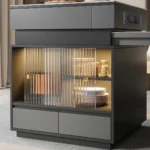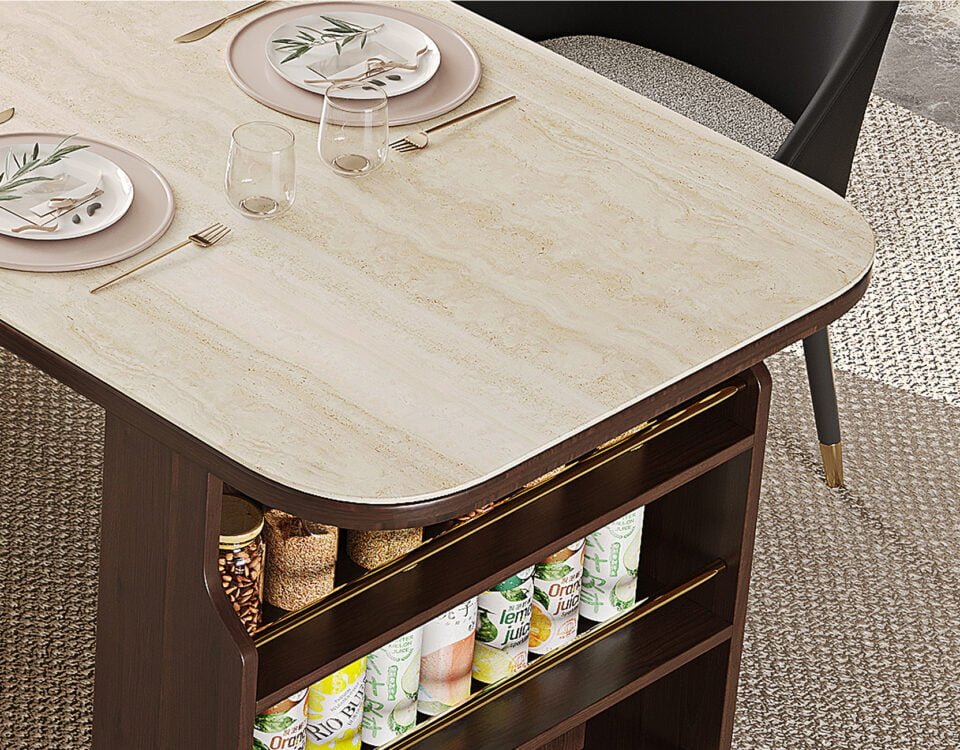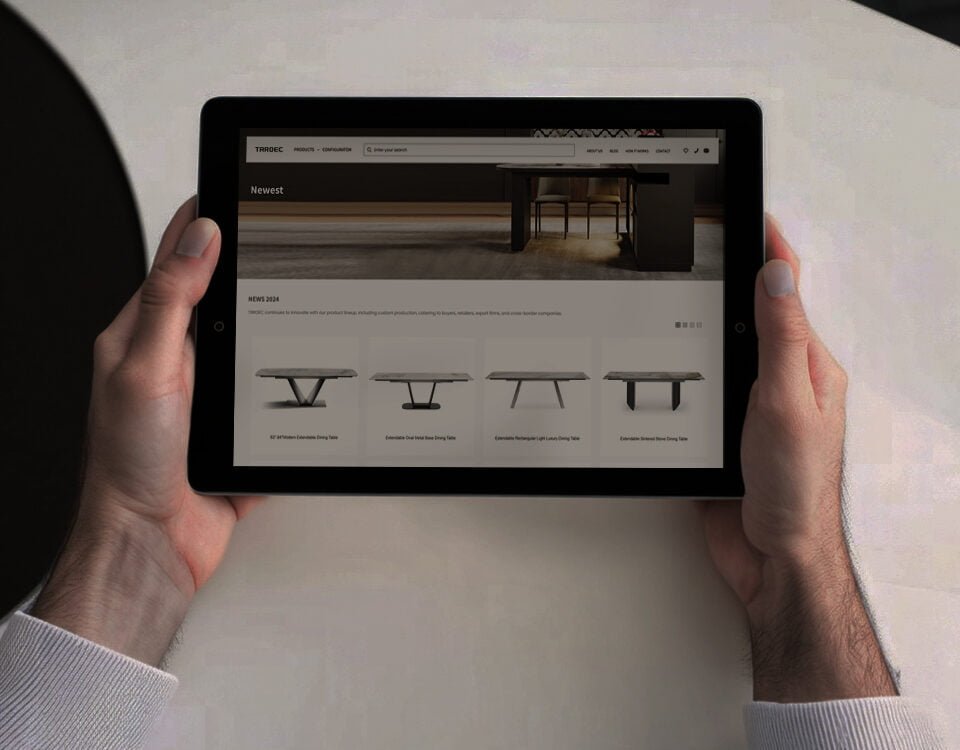1. Introduction
Dining room furniture is a cornerstone of both residential and commercial dining spaces, serving as a key element in setting the tone and functionality of the area. For B2B clients such as trading companies, furniture stores, buyers, designers, and renovation companies, understanding the latest innovations and design trends in dining room furniture is crucial for staying competitive. This guide provides comprehensive insights into modern dining room furniture, focusing on design trends, functional enhancements, and market dynamics.
2. The Evolution of Dining Room Furniture
2.1 Historical Perspective
Dining room furniture has evolved significantly over the centuries, reflecting changes in lifestyle, technology, and design preferences.
- Early Designs: Initially, dining furniture was primarily utilitarian, crafted from heavy woods with minimal ornamentation.
- Mid-20th Century: The post-war era introduced sleeker designs and new materials like laminates and plastics, reflecting modernist influences.
- Contemporary Trends: Today’s dining furniture blends form and function, with a strong emphasis on sustainability and innovation. To learn more about the history of furniture design, visit the Design Museum’s furniture design timeline.
2.2 Influences and Inspirations
Modern dining room furniture is shaped by various cultural, technological, and environmental influences.
- Cultural Influences: Diverse global styles, from Scandinavian minimalism to Mediterranean warmth, contribute to the rich variety of contemporary designs.
- Technological Advances: Innovations in manufacturing processes and materials enable more sophisticated and refined designs.
- Environmental Concerns: Sustainability is a major driver, with increasing use of eco-friendly materials and ethical production practices.
3. Key Design Trends in Dining Room Furniture
3.1 Minimalist Aesthetics
Minimalism continues to dominate dining room furniture design, characterized by clean lines, simple forms, and functional elegance.
- Design Elements: Sleek surfaces, integrated storage solutions, and minimal hardware create a streamlined look.
- Color Palettes: Neutral tones such as white, black, and gray are popular, often complemented by natural materials like wood and stone.
3.2 Multifunctional Furniture
With space becoming a premium, multifunctional furniture is increasingly in demand.
- Examples: Extendable dining tables, storage-integrated benches, and convertible dining sets maximize space efficiency.
- Benefits: These designs offer flexibility for various activities and occasions, optimizing the use of available space.
3.3 Sustainable Materials and Practices
Sustainability is at the forefront of modern dining room furniture design.
- Eco-Friendly Materials: The use of bamboo, reclaimed wood, and recycled metals is on the rise.
- Sustainable Practices: Emphasis on energy-efficient manufacturing processes and reducing waste is crucial. For more information on sustainable furniture materials, see the Green Furniture Hub guide.
3.4 Vintage and Retro Styles
The appeal of vintage and retro styles persists, merging classic aesthetics with modern functionality.
- Design Elements: Mid-century modern pieces, retro color schemes, and vintage-inspired patterns are popular.
- Integration: Combining old and new elements to create unique, personalized dining spaces. Explore vintage furniture trends in this House Beautiful article.
4. Functional Enhancements in Dining Room Furniture
4.1 Innovative Storage Solutions
Effective storage solutions enhance the functionality and aesthetics of dining spaces.
- Built-In Storage: Dining tables with integrated drawers and cabinets offer practical storage options.
- Multifunctional Pieces: Benches with hidden storage and sideboards with wine racks provide additional functionality.
4.2 Ergonomic Design
Ergonomic design ensures comfort and usability in dining furniture.
- Seating Comfort: Chairs with ergonomic support and adjustable features enhance comfort.
- Table Design: Tables designed for optimal legroom and accessibility improve user experience. For insights on ergonomic furniture design, visit Ergonomic Trends.
4.3 Smart Technology Integration
Integrating smart technology into dining furniture enhances convenience and functionality.
- Smart Tables: Features like wireless charging pads, built-in speakers, and smart lighting are becoming popular.
- Connected Furniture: Integration with home automation systems allows seamless control of lighting, temperature, and entertainment. Discover smart furniture innovations in this Wired article.
5. Case Studies of Innovative Dining Room Furniture Designs
5.1 Residential Applications
Innovative dining room furniture designs can transform residential spaces, enhancing both functionality and aesthetics.
- Example 1: A compact apartment featuring a foldable dining table and stackable chairs.
- Example 2: A family dining room with a large, extendable table equipped with integrated storage and smart features. For examples of modern designs in real homes, see this Architectural Digest feature.
5.2 Commercial Applications
In commercial settings, well-designed dining furniture can enhance customer experience and operational efficiency.
- Example 1: A restaurant with modular seating arrangements and smart table management systems.
- Example 2: A hotel dining area with flexible furniture layouts to accommodate various events and functions. For commercial dining furniture trends, check out Foodservice Equipment & Supplies.
6. Choosing the Right Supplier and Ensuring Quality
6.1 Supplier Selection Criteria
Choosing a reliable supplier is crucial for ensuring high-quality dining room furniture.
- Reputation: Research the supplier’s history and customer reviews.
- Certifications: Look for industry certifications that indicate adherence to quality standards.
- Production Capacity: Ensure the supplier can meet your order volume and deadlines. For tips on selecting the right supplier, refer to this Entrepreneur guide.
6.2 Quality Assurance Processes
Implementing robust quality assurance processes is essential for maintaining high standards.
- Inspections: Regular inspections during production help identify and address issues early.
- Testing: Rigorous testing for durability, safety, and functionality ensures product reliability.
- Continuous Improvement: Feedback loops and continuous improvement practices enhance quality over time. Learn about best practices in quality assurance from ASQ.
7. Future Innovations and Trends
7.1 Emerging Technologies
New technologies are set to revolutionize dining room furniture design and functionality.
- AI and Machine Learning: Predictive maintenance and smart home integration offer advanced functionalities.
- Advanced Materials: Development of new materials that are more durable, lightweight, and sustainable is ongoing. For future tech trends, visit TechCrunch.
7.2 Design Evolution
Future design trends will continue to evolve, reflecting changing consumer preferences and technological advancements.
- Personalization: Increased demand for custom-designed furniture that meets specific needs and preferences.
- Hybrid Spaces: Furniture that adapts to multi-functional spaces, blurring the lines between dining, living, and working areas. For insights on evolving design trends, see Dezeen.
8. Conclusion
In conclusion, modern dining room furniture design is a dynamic field that balances aesthetics, functionality, and sustainability. For B2B clients, staying informed about the latest trends and innovations is essential for making strategic decisions and offering products that meet market demands. By understanding key design trends, functional enhancements, and quality assurance practices, businesses can achieve success in the competitive dining room furniture market.
Don’t fall behind, subscribe to our newsletter
Feugiat bibendum vel molestie morbi litora venenatis integer phasellus laoreet id eros ipsum primis sapien aliquet curabitur enim diam nostra nullam semper donec ut commodo massa accumsan quisque







